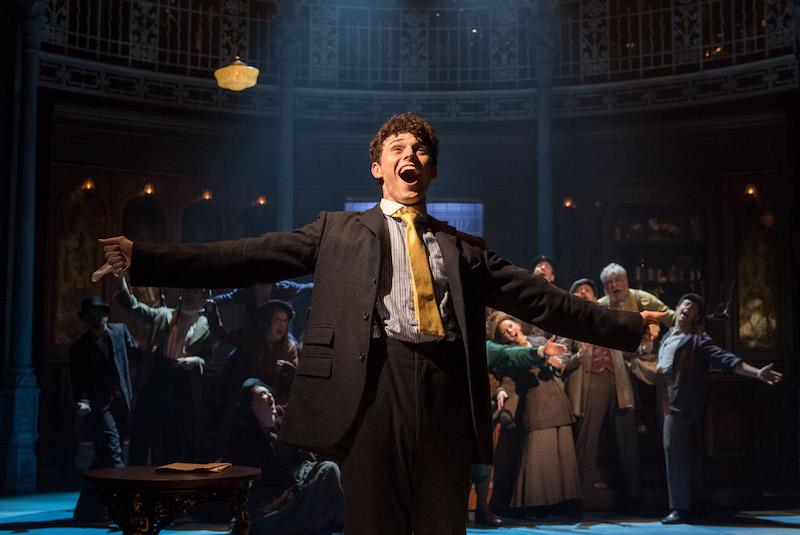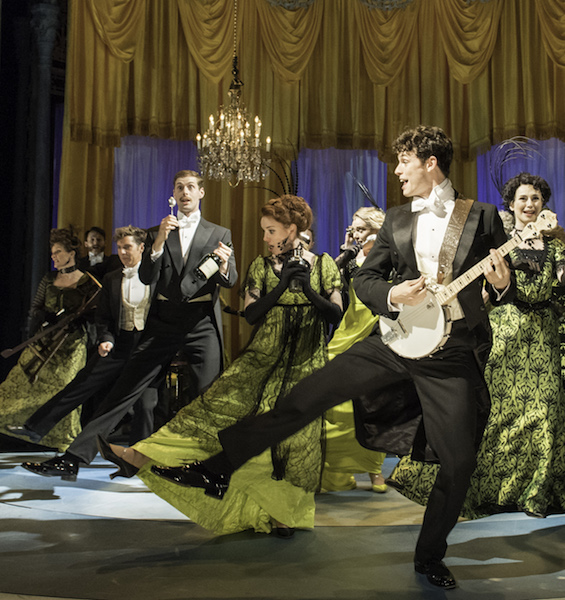Half A Sixpence, Chichester Festival Theatre | reviews, news & interviews
Half A Sixpence, Chichester Festival Theatre
Half A Sixpence, Chichester Festival Theatre
The Tommy Steele musical gets a triumphant, banjo-rehabilitating refresh

Watching Cameron Mackintosh’s joyful revision of this Sixties musical, it’s possible to believe for a moment that all the world needs now is love sweet love and a shit-ton of banjos. With a new book by Downton Abbey behemoth Julian Fellowes, new numbers by the pair behind hit musical Mary Poppins, and design that delights at every turn of the multi-revolve, Half A Sixpence seems destined to follow a flush of previous Chichester Festival musicals into the West End.
Charlie Stemp. Isn’t that just the best name? It’s as if the 22-year-old’s parents knew he’d one day take on the memory of Tommy Steele, around whose talents and teeth the original 1963 musical and subsequent film was built. In fact, Stemp first played the role of Arthur Kipps – the cockney lad who inherits, loses and regains a fortune – in a college production three years ago. Favoured CFT choreographer Andrew Wright (Singin’ in the Rain, Guys And Dolls) happened to be in the audience.
This feels like the end of a hosepipe ban on happiness
We’re in the realm of gleeful coincidence, after all. Based on a semi-autobiographical novel by HG Wells, Half A Sixpence is one of those tales in which a young man trips over a fortune while chasing after a girl. Wells, it turns out, has strong local links – the novel and the show draw on his time as an apprentice draper just down the road in Southsea. This, and the 150th anniversary of his birth, all add to a satisfying feeling of rightness about Rachel Kavanaugh's production. Never mind the massive inherent contradiction: that Half A Sixpence is a very big and very expensive argument for the simple life, an exhaustively lavish celebration of larking about.
Designer Paul Brown’s fantastic set centres on an Edwardian bandstand framed by dunes. The mechanism itself is thrilling to watch, as you glimpse the golden instruments of the orchestra like the inside of a pocket watch. The revolving stage suggests Kipps’ uneasily shifting fortunes and serves a gorgeous kaleidoscope of colour: the rich emerald of the drapers, the warm amber of the Hope And Anchor pub, the waspish lime and black of a bitchy high society soirée.
Projected skies bring an emotional tint to the youthful love story. We first meet Kipps and his childhood sweetheart Ann (Devon-Elise Johnson) playing pirates on a beach backed with Aquafresh blue. It’s like Dickens with Instagram filters. The set is also the perfect playground for Stemp’s boyishly handsome Kipps, who swings from pillars, cartwheels across the bar and strums his famous banjo with teeth flashing and dark curls bouncing. He has easy cockney charm and some kind of internal spring. Even his dropped "h"s have a natural lift.
 But Fellowes has reconfigured the musical from a vehicle for one man’s fame into a true ensemble piece. Composer George Stiles and lyricist Anthony Drewe have refreshed David Heneker’s original score and written seven new songs that more than earn their keep, especially as they serve the female characters. The pernickety "Just A Few Little Things" takes just the right amount of sheen off Ann’s posh love rival, Helen (Emma Williams). A bawdy pier-side duet between Ann and another Kipps admirer, in which the young women commiserate with each other about their knickerbocker glories still being intact, appeals to modern audiences while tuning into Wells’ own liberal attitude to sex.
But Fellowes has reconfigured the musical from a vehicle for one man’s fame into a true ensemble piece. Composer George Stiles and lyricist Anthony Drewe have refreshed David Heneker’s original score and written seven new songs that more than earn their keep, especially as they serve the female characters. The pernickety "Just A Few Little Things" takes just the right amount of sheen off Ann’s posh love rival, Helen (Emma Williams). A bawdy pier-side duet between Ann and another Kipps admirer, in which the young women commiserate with each other about their knickerbocker glories still being intact, appeals to modern audiences while tuning into Wells’ own liberal attitude to sex.
Another new number, "Pick Out a Simple Tune", now gives "Flash, Bang, Wallop" a run for its money as the show-stopping centrepiece. In a very Julian Fellowes-y scene, the stuffy upper class discovers its rhythm when Kipps plucks his banjo at a musical soirée. By the end of the number, the whole hideous lot of them are pulled inexorably into the dance, bashing the family plate and playing the silver spoons (pictured above). Gerard Carey (who recently played Lord Farquaad in Shrek) brings an extra comic flourish to both numbers, as a sozzled wedding photographer and as Helen’s avaricious brother James, who tries to drown out Kipps’ banjo with quiff-quiveringly malevolent bursts on an organ.
Half A Sixpence is escapism of the highest order, and the summer audience seemed thirsty for it. It feels like the end of a hosepipe ban on happiness. If you can’t get a ticket you could do worse than join the chorus line for the triumphant finale and buy yourself a banjo (ring dang clatter jang-a). Apparently they’re all the rage in Belgravia.
rating
Share this article
Add comment
The future of Arts Journalism
You can stop theartsdesk.com closing!
We urgently need financing to survive. Our fundraising drive has thus far raised £49,000 but we need to reach £100,000 or we will be forced to close. Please contribute here: https://gofund.me/c3f6033d
And if you can forward this information to anyone who might assist, we’d be grateful.

Subscribe to theartsdesk.com
Thank you for continuing to read our work on theartsdesk.com. For unlimited access to every article in its entirety, including our archive of more than 15,000 pieces, we're asking for £5 per month or £40 per year. We feel it's a very good deal, and hope you do too.
To take a subscription now simply click here.
And if you're looking for that extra gift for a friend or family member, why not treat them to a theartsdesk.com gift subscription?
more Theatre
 The Producers, Garrick Theatre review - Ve haf vays of making you laugh
You probably know what's coming, but it's such great fun!
The Producers, Garrick Theatre review - Ve haf vays of making you laugh
You probably know what's coming, but it's such great fun!
 Not Your Superwoman, Bush Theatre review - powerful tribute to the plight and perseverance of Black women
Golda Rosheuvel and Letitia Wright excel in a super new play
Not Your Superwoman, Bush Theatre review - powerful tribute to the plight and perseverance of Black women
Golda Rosheuvel and Letitia Wright excel in a super new play
 Cow | Deer, Royal Court review - paradox-rich account of non-human life
Experimental work about nature led by Katie Mitchell is both extraordinary and banal
Cow | Deer, Royal Court review - paradox-rich account of non-human life
Experimental work about nature led by Katie Mitchell is both extraordinary and banal
 Deaf Republic, Royal Court review - beautiful images, shame about the words
Staging of Ukrainian-American Ilya Kaminsky’s anti-war poems is too meta-theatrical
Deaf Republic, Royal Court review - beautiful images, shame about the words
Staging of Ukrainian-American Ilya Kaminsky’s anti-war poems is too meta-theatrical
 Laura Benanti: Nobody Cares, Underbelly Boulevard Soho review - Tony winner makes charming, cheeky London debut
Broadway's acclaimed Cinderella, Louise, and Amalia reaches Soho for a welcome one-night stand
Laura Benanti: Nobody Cares, Underbelly Boulevard Soho review - Tony winner makes charming, cheeky London debut
Broadway's acclaimed Cinderella, Louise, and Amalia reaches Soho for a welcome one-night stand
 The Pitchfork Disney, King's Head Theatre review - blazing with dark energy
Thrilling revival of Philip Ridley’s cult classic confirms its legendary status
The Pitchfork Disney, King's Head Theatre review - blazing with dark energy
Thrilling revival of Philip Ridley’s cult classic confirms its legendary status
 Born with Teeth, Wyndham's Theatre review - electric sparring match between Shakespeare and Marlowe
Rival Elizabethan playwrights in an up-to-the-minute encounter
Born with Teeth, Wyndham's Theatre review - electric sparring match between Shakespeare and Marlowe
Rival Elizabethan playwrights in an up-to-the-minute encounter
 Interview, Riverside Studios review - old media vs new in sparky scrap between generations
Robert Sean Leonard and Paten Hughes make worthy sparring partners
Interview, Riverside Studios review - old media vs new in sparky scrap between generations
Robert Sean Leonard and Paten Hughes make worthy sparring partners
 Fat Ham, RSC, Stratford review - it's Hamlet Jim, but not as we know it
An entertaining, positive and contemporary blast!
Fat Ham, RSC, Stratford review - it's Hamlet Jim, but not as we know it
An entertaining, positive and contemporary blast!
 Juniper Blood, Donmar Warehouse review - where ideas and ideals rule the roost
Mike Bartlett’s new state-of-the-agricultural-nation play is beautifully performed
Juniper Blood, Donmar Warehouse review - where ideas and ideals rule the roost
Mike Bartlett’s new state-of-the-agricultural-nation play is beautifully performed
 The Gathered Leaves, Park Theatre review - dated script lifted by nuanced characterisation
The actors skilfully evoke the claustrophobia of family members trying to fake togetherness
The Gathered Leaves, Park Theatre review - dated script lifted by nuanced characterisation
The actors skilfully evoke the claustrophobia of family members trying to fake togetherness
 As You Like It: A Radical Retelling, Edinburgh International Festival 2025 review - breathtakingly audacious, deeply shocking
A cunning ruse leaves audiences facing their own privilege and complicity in Cliff Cardinal's bold theatrical creation
As You Like It: A Radical Retelling, Edinburgh International Festival 2025 review - breathtakingly audacious, deeply shocking
A cunning ruse leaves audiences facing their own privilege and complicity in Cliff Cardinal's bold theatrical creation

Comments
Loved the film when I saw it
Loved the film when I saw it (twice) as a kid, in the days before Tommy Steele became such a turn-off. Julia Foster was enchanting to me then. I still have the booklet.